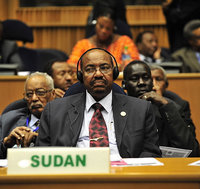When the International Criminal Court issued its ground-breaking warrant for the arrest of Sudanese President Omar al-Bashir on March 4, human rights activists celebrated the move as a major milestone. The action would not only boost hope in Darfur -- Bashir is alleged to have played a key role in the tragic conflict -- but it would also help prevent atrocities everywhere. For the first time, a sitting president faced the threat of arrest, forcing other perpetrators and would-be perpetrators of crimes against humanity to consider the trials awaiting them should they follow in Bashir's footsteps. Less than a month after the warrant's issue, however, Bashir looks nothing like an international pariah: He is traveling to other capitals, and neighboring leaders are lovingly embracing him. Nowhere was the failure of the ICC's action against the Sudanese president more evident than at this week's summit of the Arab League, where Bashir, despite being charged with crimes against humanity, received a hero's welcome. As early as last July, when ICC prosecutor Luis Moreno Ocampo filed his request for a warrant, many predicted it would make Bashir a global outlaw, "a prisoner in his own country."
World Citizen: Indicted Bashir Feels the Love from Arab League

